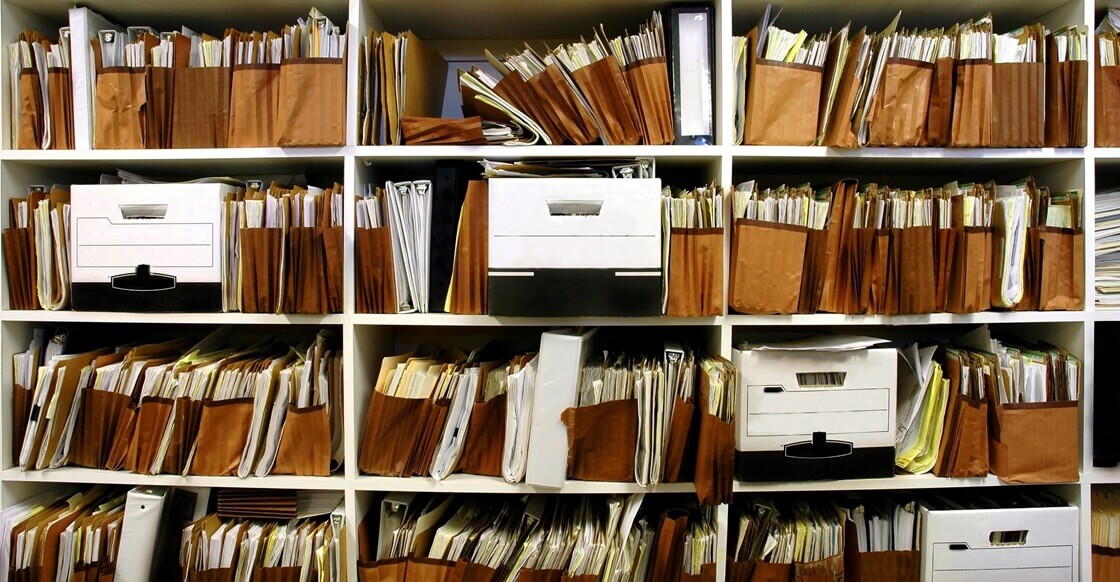Whether your office is overflowing with documents or your filing cabinet at home is beginning to creak at the edges, a self-storage unit can take the strain.
Document and File Storage is a cost-effective, convenient, and secure way of expanding your existing storage. However, for important documents and paperwork, a little care and attention are required to store them properly. Incorrectly stored paperwork can be affected by damp, mildew, mould, and even insect infestations.
In this guide, our storage experts share their top tips for safely storing all those important papers and freeing up valuable space in the office or home.
Professional advice on properly storing documents
Even as the world moves towards a “paper-free” working environment, businesses are still burdened with sheaths of space-hungry documents. Some of these might be important records, others may have to be kept because of legal obligations.
Whatever the reason, archived documents take up valuable office or home space and can reduce the efficiency of the workplace.
To help you maximise your space and have the peace of mind that critical records are stored safely, here are our top tips for safely storing documents.
1. Spend a little time sorting through your paperwork first
It is always tempting to grab every piece of paperwork and place it all in self-storage. This may reduce the time taken to store your documents. But in the long run, this is an ineffective shortcut.
There is no point in keeping an invoice for stationery that was purchased 9 years ago. This is only shifting clutter to a new home.
Take the opportunity to thoroughly declutter your paperwork. This will save money on packing materials, storage space, and when you have to retrieve documents, the task will be so much easier.
Start by checking which documents you are legally obliged to keep and how long you have to keep them for and work from there.
It is also common for businesses to have duplicate copies of documents. Where these are identified, make sure to dispose of them securely rather than having multiple copies of one document stored.
2. Make sure the documents are clean and dry
Food crumbs and other debris from those working lunches can attract pests, become mouldy, or stain & taint paperwork. Make sure that documents are free from such debris before placing them into self-storage.
Making sure they are free from dampness is also essential. This is particularly relevant if they have previously been stored in an attic, shed, warehouse or another damp environment.
In these instances, try to leave paperwork in a dry environment for a few days before placing them into storage.
3. Use proper archive boxes or good quality storage materials
Documents and paperwork are heavier than most people imagine and using cheap packing materials or flimsy boxes is a recipe for disaster. Invest a few pounds in good-quality archive boxes.
This will prevent the nasty shock that comes from opening your storage unit only to find a heap of crumpled boxes and jumbled-up paperwork. It is also a good idea to use breathable storage materials that will let any damp residue evaporate from stored paperwork.
On a similar point, no matter the quality of the packing materials you use, don’t be tempted to over stack the boxes. This may save a little floor space but removing heavy boxes from the top of tall stacks is difficult and can be dangerous. It also greatly increases the chance of finding collapsed stacks when you return to the unit.
4. Label properly and plan a filing system
This might be a little time-consuming at the storage, but a proper labelling and filing system will pay dividends when the time comes to retrieve documents. When creating such a system, it is always good practice to store files that may be required more frequently in such a position where they can be accessed easily.
Try to organise your unit around this practicality. For instance, documents that are only being stored for legal reasons (e.g. archived payroll records) can be tucked away at the back of the unit or at the bottom of stacks.
5. Make sure the self-storage unit is large enough
When calculating how much storage space you require, remember to allow for enough space so that you can access all your files. It is always tempting to go for the smallest unit possible. But it is important to leave enough room that you can safely navigate the unit and have access to all your stored documents.
In essence, this means getting a unit that is large enough to handle all your paperwork and still leave room to allow easy access to all the stored documents.
Conclusion
Documents that are properly stored will remain in mint condition for as long as they might be needed. A little care and attention, some forethought, and a little extra time as you prepare them for storage will make the whole process much easier and greatly reduce the chances of encountering a nasty surprise when you need to retrieve papers or documents.
Our team at Belfast Self Storage is always ready to assist you with your storage needs. We have years of experience in providing secure self storage solutions for both personal and business records. Our storage facilities are equipped with CCTV for added security, and we offer a range of storage unit sizes to suit your needs. So, don’t wait, contact us today and let us help you with your document storage needs.


